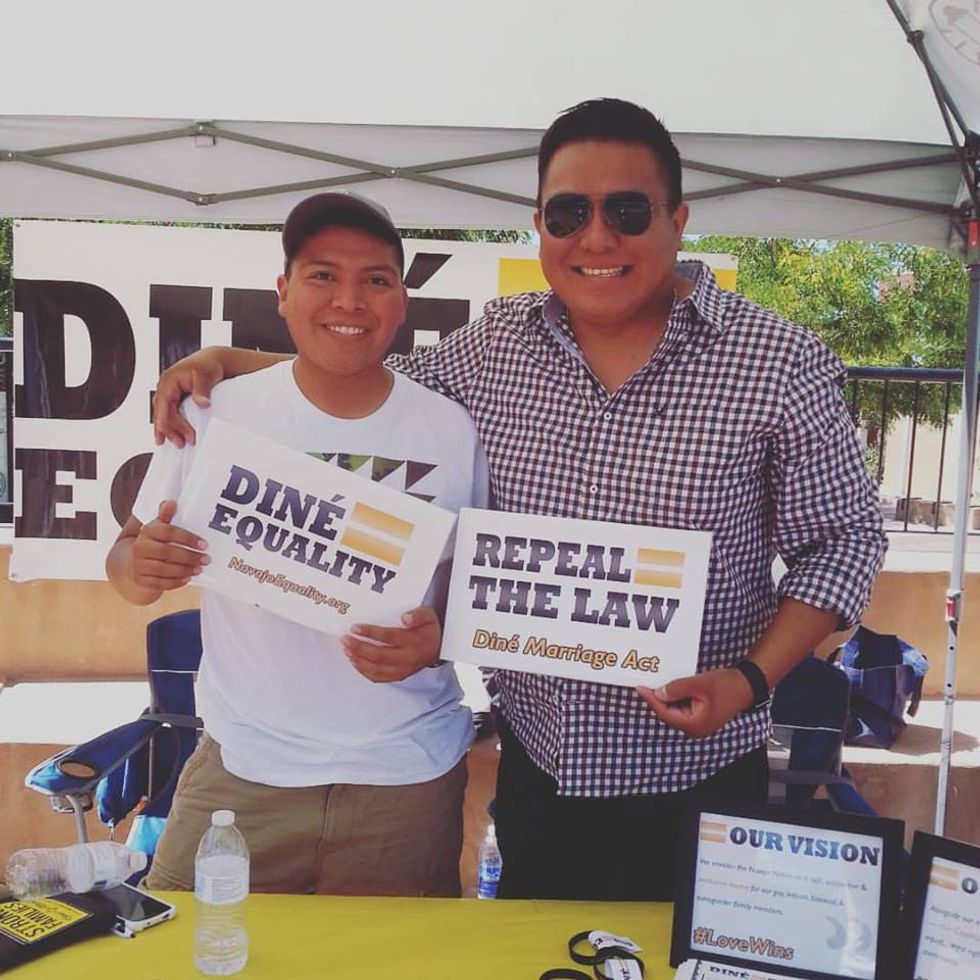This month we celebrate the pride that the LGBT community displays and week marks the one year anniversary of the U.S. Supreme Court's historic decision in favor of marriage equality, making it so that same-sex couples marriage are legally recognized across the nation. This has little to no impact towards how we treat same-sex couples living on the Navajo Nation because of the discriminatory 2005 Diné Marriage Act. Regrettably, the struggle for the basic human right of marriage still exists in many Native American nations in the country.
Currently, there are eleven Native American Nations across North America that still prohibit same sex marriage, regardless of the marriage equality ruling by the U.S. Supreme Court. In those eleven Nations, there are “Protection Acts” that allow federally-recognized tribes to establish their own laws that are not subject to the U.S. Constitution. The Navajo Nation, which is the largest Native American territory and spans three states, is one of the eleven Nations that has shown a strong anti-same sex marriage rhetoric.
Out and Proud Navajo LGBTQ+ rights advocates Alray Nelson (right) and his partner Brennen Yonnie (left) are the founders of the Coalition for Navajo Equality. They have made progress in receiving support from Native members, but still face some resistance from others in their attempt to undo the 2005 Diné Marriage Act.
In April of 2005, the eighty-eight members of the Navajo Nation Council passed the CAP-29-05 resolution, which in turn amended Title 9 of the Navajo Nation Code in regards to domestic relations. The measure introduced by Former Council Delegate, Larry Anderson, Sr., passed with sixty-seven members in favor and zero opposed the bill. The amended section 3 of the law defines marriage as being only between a man and a woman. Larry Anderson alluded that the purposes of the law is to promote strong families and to preserve and strengthen family values.
In a interview with Nelson, he made it clear to that these “neoconservative ideas” displayed by the council and current Navajo Nation's President Russell Begaye are not endemic to Navajo culture but were introduced by the white man’s colonization. At least one hundred sixty-five native tribes had gender traditions that existed in North America historically, when many of this native cultures accepted and respected individuals encompassing a balance of both feminine and masculine qualities. To support this claim, the Navajo Nation has a history of persons who identified with different genders and sexual preferences, called nádleehí and now fall under the LGBTQ+ umbrella term “two-spirited." Two-spirited is having both the male spirit and female spirit characteristics combined in one person.
Nelson himself does not classify as two-spirited, but uses these histories to validate same-sex couples in Navajo history and tradition. He stated that, “Those relationships were there, they were recognized, and they had every right to be productive members of our community.” Nelson and the Coalition for Navajo Equality are currently trying to overturn the 2005 Diné Marriage Act, which he believes was enacted in continuation of President George W Bush's 2004 push for a constitutional amendment that would define marriage as between one man and one woman.
Note that there is still a long road ahead toward equality and justice for those who identify as two-spirit and LGBTQ+ in the Native community. In this current time, visibility is a strong tool to make positive gains for this community. Nelson states now that at the present time The Coalition for Navajo Equality is creating a dialogue of awareness and is working for the rights and protections of transgender Native Americans and gay and lesbian youth, which are two groups that fall victim to hate crimes on and off reservations. According to the gay-rights advocacy group Freedom to Marry, since 2009 as many as twelve federally recognized tribes allow same-sex couples to marry. Nevertheless, the ten largest tribes are not included on that list. With the Navajo Nation being the largest of the 566 federally recognized tribes, it has the power to set a precedent on how to handle issues and policies dealing with the LGBT community. For more information about Alray Nelson and his group progression towards marriage equality within the native community go to http://www.navajoequality.org/




















